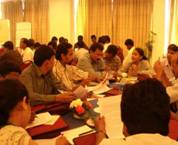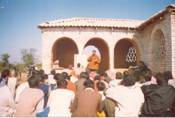|
National Rural Habitat Policy A Mission to Facilitate Access to Shelter for All
I The first draft of the ‘National Rural Housing and Habitat Policy 2006: A proposal to the Government of India’ was developed by habitat practitioners and experts from various fields. The English version of the draft was later translated in six local languages. The documents are available at: http://www. devaIt. org/taran et/ websitepages/ basinSaDefault.aspx?catalogid=133 The second version of the policy draft is now being prepared to incorporate the inputs received from the various stakeholders. The final draft will be formally handed over to the Government of India at the National Conference on Poverty Alleviation organised by Development Alternatives Poorest Areas Civil Society Program on December 4-6, 2007. This initiative is a remarkable example of how critical gaps between ‘policy and practice’ can be bridged through knowledge-driven multi-stakeholder dialogue processes. For more information please visit www.basinsa.net
As per the Census of India 2001, rural India has a shortage of 14.8 million homes that not only affects the quality of life of the people but also leaves them vulnerable to a range of stresses, both natural and manmade. While there have been several social housing schemes initiated by the government, these have included the rural society in a very limited way. In the absence of a specific national policy for development of rural habitats in a sustainable manner, the vicious cycle of poverty and vulnerability continues in rural India. The knowledge platform is simultaneously preparing to launch its Lok Awas Yatra or the habitat exposure trip targeting Panchyati Raj Institutions (PRls) and government functionaries. The aim is to demonstrate the ‘pockets of successes’ across India, mostly in the form of small pilot programmes that have tried different approaches to service the habitat needs of rural communities. qAbhishikta Roy |

 However,
the mission goes far beyond housing, and looks at the overall habitat
concerns of the rural poor, namely improved access to land, easier and
friendly options for credit finance, simple legal and regulatory
procedures, integrated access to basic infrastructure along with
shelter, effective delivery mechanisms through local entrepreneurs,
linkages between livelihood creation and habitat development, enhanced
capacities of relevant stakeholders, and transparent processes for
monitoring implementation.
However,
the mission goes far beyond housing, and looks at the overall habitat
concerns of the rural poor, namely improved access to land, easier and
friendly options for credit finance, simple legal and regulatory
procedures, integrated access to basic infrastructure along with
shelter, effective delivery mechanisms through local entrepreneurs,
linkages between livelihood creation and habitat development, enhanced
capacities of relevant stakeholders, and transparent processes for
monitoring implementation.